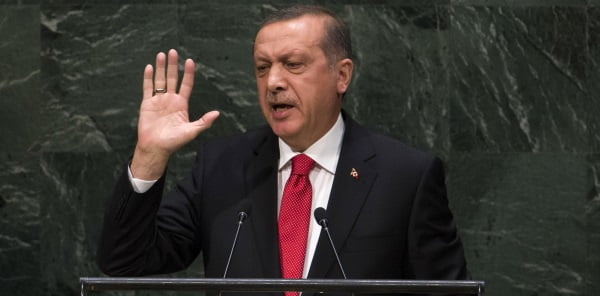Bank Asya fights back against Erdogan attack

Date posted: October 27, 2014
ERIC ELLIS
Ahmet Beyaz, the chief executive of Turkey’s government-besieged Bank Asya, says his bank is the victim of a political campaign waged by Turkey’s powerful president Recep Tayyip Erdogan.
Speaking in an exclusive interview with Euromoney at Bank Asya’s modern headquarters on Istanbul’s Asian side, Beyaz and his executive vice-president Feyzullah Egriboyun described how Erdogan seems intent on destroying Bank Asya, Turkey’s leading Islamic – or ‘participation’ bank – and attempting to deploy state institutions in shutting it down for political purposes.
In a strong yet measured rebuttal of the Erdogan camp’s tactics against Bank Asya, Beyaz and Egriboyun claim the repeated attacks on the bank clearly constitute a crime under Turkey’s strict banking legislation.
The ‘protection of reputation’ article of Turkey’s banking law, introduced after the country’s devastating banking crisis of 2001, states “no real or legal person shall intentionally damage the reputation, prestige or assets of a bank or disseminate inaccurate news either using any means of communication”. Convicted violators of the code face up to three years in prison.
The Turkish president has denied any orchestrated campaign against Bank Asya, telling a government-allied business chamber in Istanbul last month that “there is no work being done to sink a bank”.
‘Bank already failed’
However, without naming Bank Asya, Erdogan went on to say “this bank has already failed. But they are trying to keep it afloat with a few buckets of water. Shall we repeat past mistakes and keep alive such a failed financial institution?”
Such claims are wrong, Beyaz tells Euromoney, insisting Bank Asya is among the three strongest banks in Turkey, boasting a capital adequacy ratio at about 20%, higher than is statutorily required under Turkey’s strict post-crisis regulations and the Basel directives.
The government’s 10-month attack on Bank Asya has seen its share price slump by 50%, with the stock periodically prevented from trading on the Borsa, Istanbul’s stock exchange. The turmoil surrounding the bank has seen the failure of an agreed deal with the Qatar Islamic Bank, and an unwanted government-led attempt by state-owned deposit bank Ziraat, which recently created an Islamic unit, to absorb the privately owned Bank Asya.
Erdogan has also chastised Turkey’s notionally independent banking overseer, the Banking Regulation and Supervision Agency, known by its Turkish acronym BDDK, for not moving on Bank Asya.
“The BDDK must make a decision and steps must be taken accordingly,” Erdogan told reporters last month. “Otherwise it is the BDDK that will be responsible.”
The campaign against Bank Asya began in December. Since then, Beyaz has been forced to field frequent attacks in Turkey’s pro-government media and from Erdogan allies who cite Bank Asya’s strong links to the opposition Hizmet (service) movement of US-exiled Islamist scholar Fethullah Gülen.
Erdogan supporters see Bank Asya as a foundation stone financing the Gülenist business empire in Turkey, a money machine which they claim funds a campaign to topple Erdogan and his long-ruling Justice and Development Party from power.
Erdogan has accused Gülen of attempting to establish a “parallel state” in Turkey. A key backer of Erdogan’s rise to power in 2003, Gülen and Erdogan have since become bitter political and religious rivals, with the 73-year-old Gülen stewarding Hizmet from self-imposed exile in the US.
Founded in 1996 by Gülen sympathizers, Bank Asya makes no secret of its “historic” connections to the Gülen movement.
However, Beyaz tells Euromoney that such links have no bearing on the day-to-day “professional running” of the bank. “We are professionals just like any other bank,” he says. “There are no hidden agendas.” Beyaz denies Bank Asya is a Gülenist financier.
Beyaz says “our bank became a target from the government” in the wake of a corruption scandal that implicated senior members of the Erdogan administration, which the president has claimed is the work of Gülenists operating inside the Turkish civil service.
Soon after that scandal broke, Beyaz says the bank started experiencing a sudden wave of withdrawals, notably from government-related companies which had long-standing commercial relationships with Bank Asya.
“We had been working with those companies for several years,” he says. “They were good clients. We had no problems with them. We had good relations.”
In September, authorities in Ankara also annulled a tax collection agreement it had with Bank Asya, which is believed to have lost more than 20% of its total deposits in recent months.
“We’ve had a very tough time,” Beyaz says. “[Erdogan] controls the bureaucracy, everywhere. But we are successfully managing the situation.”
Bank Asya supporters argue that the Erdogan attacks on Bank Asya pose a systemic risk to the wider Turkish banking system, threatening Turkey’s economic resurgence. Most analysts – and Beyaz too – dismiss this threat, citing Bank Asya’s relatively modest size, comprising less than 2% of Turkish banking assets.
“This is not a too-big-to-fail bank,” says one analyst.
However, Beyaz cites the widespread sentiment among Turkish bankers, analysts and academics that the campaign on Bank Asya poses a challenge to modern Turkey’s secular economy and the independence of its democratic institutions, with concerns about the “disturbing” signals such officially sanctioned tactics sends to prospective investors.
“Today, its Bank Asya,” one banking analyst warns Euromoney. “Who will it be tomorrow? Someone else Erdogan doesn’t like?”
Source: EUROMONEY , October 22, 2014
Tags: Democracy | Hizmet and business | Hizmet and politics | Turkey |
























